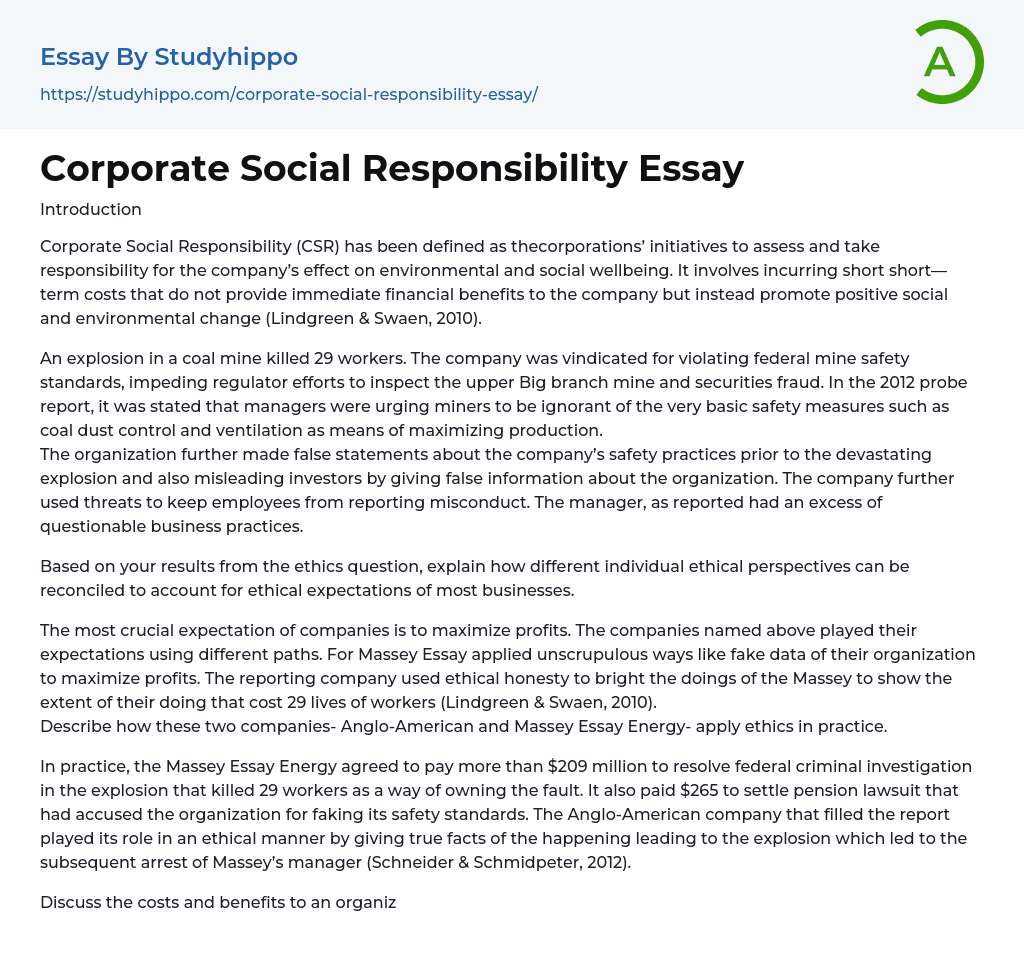Introduction
Corporate Social Responsibility (CSR) refers to the actions taken by corporations to evaluate and assume responsibility for their impact on the environment and society. These actions may incur short-term costs that do not have immediate financial benefits, but instead contribute to positive social and environmental change (Lindgreen & Swaen, 2010). In this context, a company responsible for a coal mine where an explosion occurred resulting in the death of 29 workers was found guilty of violating federal mine safety standards, obstructing regulators' inspections of the upper Big Branch mine, and committing securities fraud.
In the 2012 probe report, it was revealed that managers were encouraging miners to disregard essential safety measures such as controlling coal dust and ensuring proper ventilation to maximize production. The organization also made false statements regarding their safety practices before the trag
...ic explosion, and provided misleading information to investors. Additionally, the company employed threats to prevent employees from reporting wrongdoing. It was reported that the manager had engaged in numerous questionable business practices.
The text discusses how different individual ethical perspectives can be reconciled to account for the ethical expectations of businesses. The main expectation for companies is to maximize profits, and the companies mentioned in the text, Massey Essay and Anglo-American, approached this expectation differently. Massey Essay opted for unscrupulous methods, such as fabricating data, in order to maximize profits. In contrast, Anglo-American employed ethical honesty to expose the wrongdoings of Massey, which resulted in the loss of 29 workers' lives. The text further explores how these two companies apply ethics in practice.
In practice, the Massey Essay Energy admitted fault by paying over $209 million to settl
a federal criminal investigation into the explosion that resulted in the death of 29 workers. Additionally, they settled a $265 million pension lawsuit that accused them of falsifying safety standards. The company that filled the report acted ethically by providing accurate information about the explosion, which led to the arrest of a Massey manager (Schneider & Schmidpeter, 2012). It is important to examine the costs and benefits an organization faces when it behaves ethically or unethically.
Build Customer Loyalty
According to Schneider & Schmidpeter (2012), consumers will abandon an organization if they perceive unfair treatment, resulting in loss of customer loyalty.
The reputation of a company in ethics plays a vital role in building a positive market image and attracting more customers. Conversely, a negative reputation can be detrimental to the organization, as unethical actions can spread rapidly through social networks, tarnishing the organization's image.
Employee Retention
All employees expect to be rewarded and recognized for their hard work and loyalty. They desire promotions based on merit rather than personal bias.
When companies treat their employees fairly, the chances of retaining them are significantly higher. Conversely, employees who are not motivated by compensation are usually not dedicated, which leads to a decline in company production (Lindgreen ; Swaen, 2010).
Positive Work Environment
Employees should be honest about their capabilities and experience and foster positive relationships with their coworkers. If employers catch employees engaging in unethical behavior, it harms their chances of advancing within the company (Lindgreen ; Swaen, 2010). Theft is an example of poor ethics.
In certain industries, taking shortcuts to achieve profits can be financially detrimental to businesses. This
includes noncompliance with regulations, labor laws, worker safety hazards, or the use of substandard materials. The penalties imposed on organizations for these actions can lead to significant financial losses.
The organization may suffer long-term damage to its reputation (Lindgreen ; Swaen, 2010).
- References
- Lindgreen, A., ; Swaen, V. (2010). Corporate social responsibility. International Journal of Management Reviews, 12(1), 1-7.
- Schneider, A., ; Schmidpeter, R. (2012). Corporate social responsibility. Verantwortliche Unternehmensfuhrung in der Praxis, Berlin ua.
- Board Of Directors essays
- Brand Management essays
- Business Ethics essays
- Business Management essays
- Change Management essays
- Comparative Analysis essays
- Decision Making essays
- Dispute Resolution essays
- Knowledge Management essays
- Leadership essays
- Leadership and Management essays
- Manager essays
- Operations Management essays
- Performance Management essays
- Product Management essays
- Project Management essays
- Quality Management essays
- Risk essays
- Risk Management essays
- Scientific Management essays
- Stress Management essays
- supply chain management essays
- Time Management essays
- Total Quality Management essays
- Accounting essays
- Andrew Carnegie essays
- Automation essays
- Business Cycle essays
- Business Intelligence essays
- Business Model essays
- Business Operations essays
- Business Software essays
- Cooperation essays
- Cooperative essays
- Corporate Social Responsibility essays
- Corporation essays
- Customer Relationship Management essays
- Family Business essays
- Franchising essays
- Harvard Business School essays
- Harvard university essays
- Human Resource Management essays
- Infrastructure essays
- Inventory essays
- Logistics essays
- Management essays
- Manufacturing essays
- Market essays
- Marketing essays
- Multinational Corporation essays




